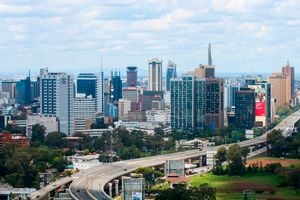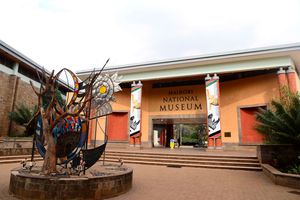
President William Ruto and Haitian Prime Minister Ariel Henry at State House, Nairobi on March 1, 2024.
A few days ago, Ariel Henry resigned from his position as Haiti’s prime minister as law and order in the long-suffering poor Caribbean nation continued to collapse.
Henry is stranded in Puerto Rico after being prevented by armed gangs from returning home. He left Haiti in late January to visit Guyana and Kenya, where he signed agreements on the deployment of a Nairobi-led international security force to help tackle the violence in his country.
Having been interim president since July 2021, after former President Jovenel Moïse’s assassination, some Haitians questioned the legitimacy of his unelected government.
His resignation was one of the main demands of the armed gangs that have in recent weeks taken over the capital, Port-au-Prince, in a wave of violence.
The gangs attacked the main prison, seeing thousands of inmates escape, and police stations and the capital’s international airport and port.
Nearly 400,000 people have been displaced in the capital as women endure extreme violence. Haiti looks set to be one of the few countries where criminal street gangs have seized power.
This is the powder keg into which Kenya is supposed to jump and help to stabilise the place enough to end the horrific violence and enable the warring political factions (and presumably gangs) to birth a new political settlement.
The planned Kenyan role in Haiti has not got much traction domestically. Many Kenyans think the mission is madness.
First free black republic
A recent viral video showed a teary writer Ngũgĩ wa Thiong’o, heartbroken at what he saw as Kenya intervening in Haiti as an imperialist running dog. Many other Africans and Haitians are opposed to the deal.
Part of the opposition is not necessarily anti-Haitian but driven by the wider dynamics of Kenyan politics and a continuation of the necessary democratic contest against President William Ruto’s regime.
The other, however, is a result of a new narrow and mutated ideological vision which, unlike the old pan-Africanism of Kwame Nkrumah and Julius Nyerere, pushes an apolitical version.
It celebrates pan-African culture, scholarship, stories, history, movement and continental trade but draws the line when men and women pick up guns. They have their hearts in the right place and are wonderful people, but they should be ignored.
Several issues have been raised. One is what business Kenya has intervening so far away. In 1804, Haiti, then a French (African slave) colony known as St Domingue, declared independence after a heroic struggle.
It became the first free black republic in the world, the first independent state in the Caribbean and the second independent state in the Western Hemisphere after the United States.
Life has not been kind to it. It has been tormented and abused by cruel and corrupt leaders and endured unspeakable violence and extreme poverty for most of the 220 years.
Can Kenya really solve such an intractable situation? No, it can’t, but it can open a possibility for relief. Enlightened intervention is possible. The African Union (AU) exhorts us to be pan-Africanist and come to the rescue of the global African family.
Reconstruction contracts
As some good scholars summed it up, it encourages “the solidarity of Africans worldwide...based on the belief that unity is vital to economic, social and political progress and aims to ‘unify and uplift’ people of African descent [which Haitians are]. [Pan-Africanist] ideology asserts that the fates of all African peoples and countries are inter-twined...African peoples, both on the continent and in the Diaspora, share not merely a common history, but a common destiny.”
To some, though, that is too much soapy sentimentalism. They want to know where the money, ugali and beans are.
Not good form, but let us go there. Africa has left this intervention business to, especially, the Western powers and, lately, Gulf States, for far too long. Kenyan police are likely to be killed; it is the nature of things when guns and grenades are in play.
But Kenya can get a good geopolitical and economic pay-off if it succeeds in Haiti. Around the world power tables, it will no longer sit at the back. It will not get front-row seats but the second row is possible.
When President Ruto calls the state houses of the leading power capitals of the world, his call will be picked up immediately. If, say, Malawi’s President Lazarus Chakwera rang the same people, he would be told that they would return his call.
The next thing would be how to ‘monetise’. There will be reconstruction contracts in Haiti that Kenya could snag. There will be relief food to supply to Haiti’s hungry, displaced by chaos. Nurses and teachers (if they speak French) could be dispatched. Kenyan banks could get to fund projects.
It sounds crass but, if they don’t, the Americans and French will run away with the deals. This is how the real world works. Too many people can’t handle it—or don’t want to face it. President Ruto shouldn’t be one of them.
Mr Onyango-Obbo is a journalist, writer and curator of the “Wall of Great Africans”. @cobbo3










